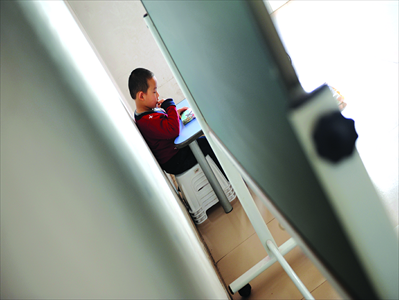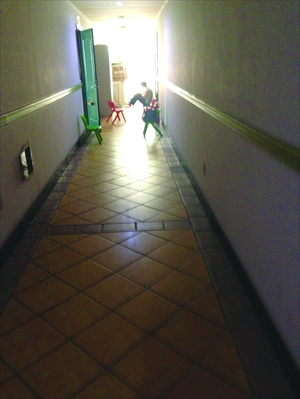Arrested development
Raising a child with autism spectrum disorder can be a challenging experience for parents made all the more daunting by the range of so-called remedies to the incurable developmental disorder.
Medication, acupuncture, nutritional supplements and even surgery have been touted as offering solutions to autism. For some parents, desperation for respite can blind them to the traps of pseudo-medical treatments offered by profit-driven professionals, clinics or companies.
More children than ever are being diagnosed with autism, which is characterized by the inability to interact or communicate socially. In the US, the Centers for Disease Control and Prevention estimates that one in 88 children has autism. In China, more than 32,000 children were reported with the disorder as of 2011, according to Autism China, a support network for families of autistic children.
'Miracle' biotech treatments
Enquiring about "autism treatment" on China's top search engine Baidu yields dozens of hospitals and clinics promising cures, with buzzwords like "instant results," "high cure rates," "biotechnology" and "stem-cell therapy" common in their descriptions.
The pediatrics department of the Beijing Guoji Traditional Chinese Medicine Hospital is inundated daily with anxious parents waiting for appointments with doctors to discuss biotechnological treatments for their children who suffer autism, attention-deficit hyperactivity disorder (ADHD), tic disorders and other neural development problems.
A doctor at the hospital, who only gave his surname as Cao, said they used "internationally advanced biotech treatment" to "repair damaged nerves and improve linguistic, social and cognitive abilities."
The controversial treatment involves injecting a child's back and limbs with "implant bioproteins" to allegedly cure the disorder.
Such treatment for children showing mild signs of autism costs between 3,000 and 5,000 yuan ($490-$817) each time, said Cao, adding that about 3,000 children who have received the treatment have recovered at a "cure rate of 96.3 percent."
Even though there are fears such treatment methods are not only ineffective but harmful, many parents are willing to give it a try. One mother of a 15-year-old boy with ADHD from Hebei Province took her son for his first round of biotech treatment last Friday at the hospital. The cost was 6,000 yuan.
Beijing Goldbaby Children's Hospital claims to have cured more than 50,000 children with autism, according to a doctor surnamed Zhang at the hospital. Boasting their own method dubbed the "four-dimensional comprehensive solution," which includes adjusting organ functions, rehabilitating damaged nerves, integrating psychological deviations and reconciling emotional connections, the hospital claims to be a one-stop shop for autism treatment.
Zhang Xuan, a teacher at George Mason University in Washington DC and a board-certified behavior analyst, receives inquires from parents on her blog every day. "Half of them are about assorted remedies, which the parents keep hearing about and cannot decide whether to try or not," said Zhang.
Zhang has pertinent advice to parents: if treatment sounds too good to be true, it probably is. Often the healthcare professionals who offer such cure-alls have questionable credentials, she said. "Parents [of autistic children] all want magical, instant treatments, but they don't exist," Zhang said.
Beijing: capital of treatment
As the country's capital and China's most advanced medicine center, Beijing has become a Mecca for parents of autistic children nationwide.
Careers, marriages and friendships are often sacrificed by parents, many of whom leave their hometowns and spent more money than they can afford on treatment for their autistic child in Beijing.
A father, surnamed Fang and originally from Henan Province, traveled across the country seeking treatment for his 2-year-old son before coming to Beijing. Doctors who have examined Fang's son have so far declined to diagnose the boy as autistic, saying he is still too young.
"I know there's only a 20 percent chance that my son isn't autistic," said Fang, who plans to take his son to Peking University Sixth Hospital.
Fang said he was aware of alternative treatments promising to cure autism, but said negative feedback from other parents had convinced him they were scams.
"I've been researching autism online for a year. There are so many remedies," said Fang. "But if they were true and had cured so many children, why hasn't any parent come forward saying their child is cured?"


In addition to misleading treatments from the medical profession, parents of autistic children must also grapple with limited and costly education options for their kids. Photos: CFP

A father waits in the corridor of Chaoyang district special school Chuhe Children's Education while his autistic child attends class. Photo: Yin Lu/GT
Special education shortage
"It's never easy raising an autistic child," a 63-year-old grandmother, surnamed Li, said to parents and other grandparents seated on stools in the corridor of Chuhe Children's Education, a special school in Chaoyang district.
Inside the classroom, teachers encourage autistic children to do activities on rubber mats and exercise balls.
"It is universally acknowledged that people haven't found the exact origin of autism, and there is no recognized case of it being cured. Applied behavior analysis is one of the most common methods for managing symptoms," said Yan Pan, the headmaster at Chuhe who has five years' experience in autism behavior intervention.
"What we can do is improve [autistic] behaviors and help children adapt to society," Yan said of the school, which opened last year.
For 3,000 yuan, children can attend 14 three-hour sessions each month at the school. Although the fee is standard among special schools in Beijing, for many families it is an unaffordable burden.
But there are alternatives, such as China's first non-governmental educational organization, Beijing Stars and Rain. Since 1993, the school has taught autistic children and offered training courses to parents.
Yan said special education in China is still undeveloped, primarily because of a national shortage of qualified teachers.
The job requires great patience and compassion, although monthly salaries are just 3,000 yuan at Yan's school.
Like so-called remedies, educational methods for autistic children vary greatly. Music therapy, games and other activities are common, although few are proven to scientifically help children cope with their disorder, Zhang said.
Minimal support
Many parents persist with sending their autistic children to mainstream schools to give them the same educational opportunities as other children. "All I want is for my grandson to attend a normal elementary school, even if he only makes to the third grade," said Li, holding back tears.
The 1994 UNESCO Salamanca Statement called on all countries to pay high priority to inclusive education, specifically by not segregating students with special learning needs. Zhang also points out that mixing autistic and non-autistic children in school can be beneficial for the former.
Findings of a study in Beijing published in this month's edition of Journal of Capital Normal University confirm that parents also benefit from their autistic children's inclusive education by having less pressure and lower rates of depression compared to those whose children are enrolled at special schools.